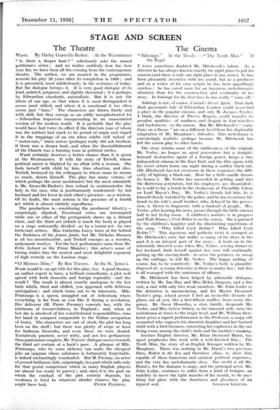the Regal I HAVE sometimes doubted Mr. Hitchcock's talent. As
a director he has always known exactly the right place to put his camera (and there is only one right place in any scene), he has been pleasantly inventive with his sound, but as a producer and as a writer of his own scripts he has been appallingly careless : he has cared more for an ingenious melodramatic situation than for the construction and continuity of his story. In Sabotage for the first time he has really "come off."
Sabotage is not, of course, Conrad's Secret Agent. That dark drab passionate tale of Edwardian London could never find a place in the popular cinema, and only M. Jacques Feyder, I think, the director of Thease Raguiri, could transfer its peculiar qualities—of madness and 'despair in four-wheelers
and backstreets—to the screen. But Mr. Hitchcock's "varia- tions on a theme " are on a different level from his deplorable
adaptation of Mr. Maugham's Ashenden. This melodrama is convincingly realistic, perhaps because Mr. Hitchcock has left the screen play to other hands.
The story retains some of the ruthlessness of the original. Mr. Verloc, no longer an agent provocateur but a straight-
forward destructive agent of a foreign power, keeps a tiny independent cinema in the East End, and the film opens with his secret return home one night during a sudden black-out.
(Mr. Hitchcock has not overcome in these sequences the diffi- culty of lighting a black-out. How far a little candle throws its beams !) Mr. Verloc has succeeded in getting sand into the Battersea generators, but his employers are dissatisfied : he is told to lay a bomb in the cloakroom at Piccadilly Circus on Lord Mayor's Day. Mr. Verloc's friends fail him, he is himself closely watched by the police, and he has to entrust the bomb to his wife's small brother, who, delayed by the proces- sion, is blown to fragments with a busload of people. Mrs.
Verloc, after hearing the news, passes through the little cinema
hall to her living room. A children's matine is in progress and Walt Disney's Cock Robin is on the screen. She is pursued
by the children's laughter and the diminishing repetitions of the song, "Who killed Cock Robin ? Who killed Cock Robin ? " This ingenious and pathetic twist is stamped as Mr. Hitchcock's own, but unlike so many of his ideas in the past it is an integral part of the story : it leads on to the admirably directed scene when Mrs. Verloc, serving dinner to her husband, finds herself against her own will continually picking up the carving-knife —to serve the potatoes, to scoop up the cabbage, to kill Mr. Verloc. The happy ending, of course, has to be contrived : Mr. Verloc's body is plausibly disposed of: a young detective is there to marry her : but this is all managed with the minimum of offence.
Mr. Hitchcock has been helped by admirable dialogue, written by Mr. Ian Hay and Miss Helen Simpson, and a fine cast, a cast with only two weak members. Mr. John Loder as the detective is unconvincing, and for Master Desmond Tester's prep. school accent I feel an invincible distaste (it glares out at you, like a first-fifteen mufller, from every dis- guise). Mr. Oscar Homolka, a slow, kindly, desperate Mr. Verloc, and Miss Sylvia Sidney, as his innocent wife, raise the
melodrama at times to the tragic level, and Mr. William Dew-
burst gives a superb performance as the Professor, a soapy old scoundrel who supports his shrewish daughter and her bastard child with a bird business, concocting his explosives in the one living room, among the child's dolls and the mother's washing. Another English director, Mr. Brian Desmond Hurst, has upset prophecies this week with a well-directed film : The
Tenth Man, the story of an English Kreuger written by Mr. Maugham. There was nothing in Mr. Hurst's two previous films, Riders to the Sea and Ourselves Alone, to show him capable of these humorous and satirical political sequences, and the very fine melodramatic close. The credit is all Mr. Hurst's, for the dialogue is stagy, and the principal actor, Mr. John Lodge, continues to suffer from a kind of lockjaw, an inability to move the tight muscles of his mouth, to do any- thing but glare with • the dumbness and glossiness of an
















































 Previous page
Previous page